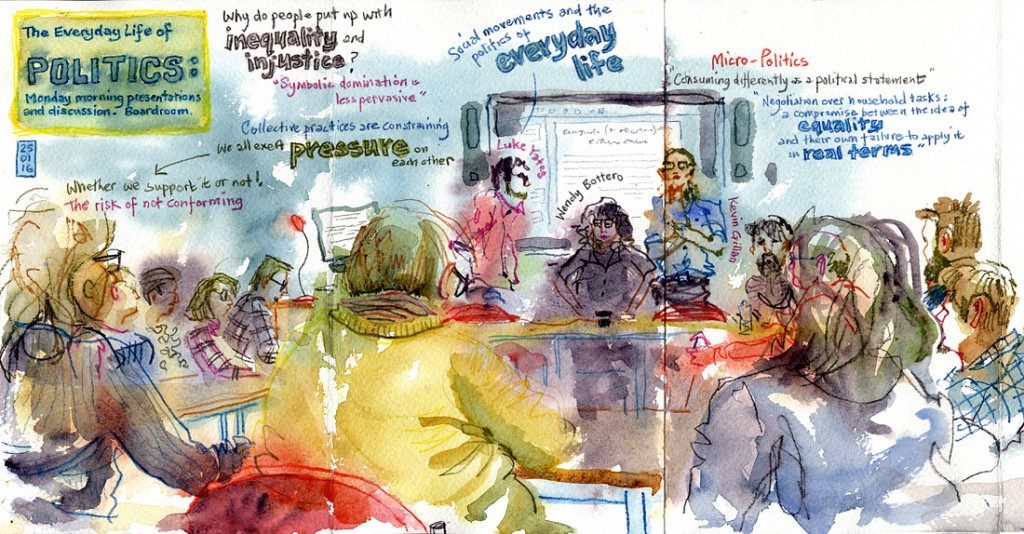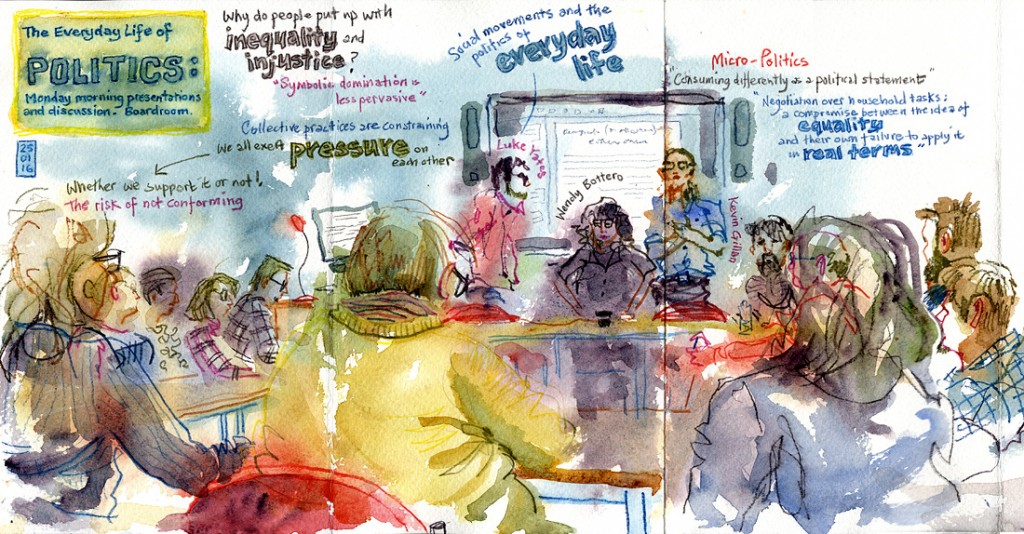
Notes on The Politics of Everyday Life

Lynne Chapman, the Morgan Centre’s Artist-in-Residence, captured this meeting in a lovely sketch. You can see some of Lynne’s other work at her blog.
This seminar was initially motivated by discussions among mem bers of movements@manchester about the ways in which political activity is integrated into the rhythms and routines of everyday life. Despite the occurrence of a number of relevant concepts within social movement scholarship, the dominant theories of movements tend to focus on public moments of mobilisation alongside explicitly politicised organisations and networks. It is clear from this scholarship that everyday life matters – it is within their personal lives that individuals often interpret grievances, develop collective identities, encounter opportunities and constraints, and are affected by the outcomes of social movements. Yet it remains unclear how it matters. Hence this seminar, in which four speakers connected to the Morgan Centre for Research into Everyday Lives, offered reflections on the politics of everyday life.
bers of movements@manchester about the ways in which political activity is integrated into the rhythms and routines of everyday life. Despite the occurrence of a number of relevant concepts within social movement scholarship, the dominant theories of movements tend to focus on public moments of mobilisation alongside explicitly politicised organisations and networks. It is clear from this scholarship that everyday life matters – it is within their personal lives that individuals often interpret grievances, develop collective identities, encounter opportunities and constraints, and are affected by the outcomes of social movements. Yet it remains unclear how it matters. Hence this seminar, in which four speakers connected to the Morgan Centre for Research into Everyday Lives, offered reflections on the politics of everyday life.
Luke Yates kicked-off the contributions with a discussion of the ways in which everyday life is already accounted for within social movement scholarship, and the puzzles that this raises. He pointed to three domains of empirical research illustrative of the kinds of advances in understanding that might be produced by a more thoroughgoing conversation between the literatures on social movements and on personal life. Firstly, research on non-political subcultures in repressive regimes signal the importance of ‘weapons of the weak’ and can develop into support for later politicization or mobilization. Secondly, examination of critical consumption and consumer activism demonstrates a very common practice interpreted by those involved as an activity oriented to social change. While such practices undoubtedly risk commodification they are embedded in other, wider attempts at social change. Thirdly, there is a great deal of systematic research on domestic divisions of labour demonstrating the many ways that people attempt to bring issues of justice (in particular understandings of gender equality) into the home. Luke interpreted this as an outcome and working through of second wave feminism that had, after all, explicitly pointed to the political nature of the everyday. These areas and others indicate that a future research programme oriented to such practices, marginal as they currently are to the field of social movement studies, would be a fruitful way to improve our understanding of the ways in which everyday practices integrate with movement activities.[1. For a copy of the slides please contact Luke Yates.]
Wendy Bottero considered the ways in which everyday critique of power structures is enmeshed with class subjectivities. She began with the question of why people put up with injustice, taking aim at answers that rely mainly (or entirely) on either misrecognition of injustice or on symbolic domination. Such theories have tended to portray this phenomenon as so overbearing that they struggle to explain the occurrence of any resistance at all. Modifications of the theories to take account of actually existing resistance increasingly respect the reflexivity of actors, but then begin to lose their coherence. The problem, Bottero argues, is not that people are unaware of the injustices that they face but that they experience such injustices as the result of external and monolithic power, against which there is little promise in opposition. How does this come about? Bottero developed an answer from a theory of power offered by Barry Barnes in which we can see individuals act according to a ‘calculated conformism’ (and a calculated sanctioning of others to conform) that patterns collective practices in a way in which people reproduce power structures that they disagree with. It is not so much a rational calculation of costs and benefits, but a combination of habitual behaviour with a recognition that most people around them will continue to conform to an expected set of norms. Resistance does occur, and can be interpreted as a switch to conforming to different norms and expectations, perhaps related to a different group.[2. Download a copy of Wendy’s slides from this link.]
In a more empirical paper, Petra Nordqvist examined the politics of reproduction. She offered an overview of political issues in the governance of reproduction, including ongoing debates on eugenics and abortion, as well the new moral issues raised by new technologies. Petra focused in donor conception. Policy and social norms on donor conception have shifted from a strong emphasis on secrecy (including stigmatization of the practice and the complete anonymity of sperm donors) to a dominant view that openness is the best policy – marked in the UK by legislation in 2005.[3. The presentation includes some information discussed in much more detail in Nordqvist, P. (2014) ‘The drive for openness in donor conception: Disclosure and the trouble with real life’, International Journal of Law, Policy and the Family, 28(3): 321-338.] But how does one live this policy in the intensely personal domain of reproduction? How does one navigate the complex terrain of explaining the difference between their Dad and their ‘biological father’ to a two-year old? (Let alone explaining it to the grandparents!) The moral issues of the debate become refracted through the politics of family relationships. The wider point here may be that when legislative change is achieved – so often the most concrete goal of many social movement organisations – the processes by which that policy is lived are complex and open-ended. [4. Download a copy of Petra’s slides from this link.]
Finally, Brian Heaphy offered a talk focused on the importance of life crises in opening moments of possibility for radical social change. Taking aim at theories that imply a shift to post-emancipatory politics in late modernity, Brian stressed two important features of the contemporary world that seem to demand a critical reflexivity that can turn from desire to alternative political imaginaries seeking emancipation. Firstly, threats of crisis – both personal and systemic – raise the spectre of ontological insecurity. In response, and seeking some sort of order, people turn to a life politics with deep ethico-political content that expresses alternative ways to live. Secondly, the ‘increased quanta of power’ that now exists across societies make a simultaneous demand for rethinking the purposes of social organisation and social practices. Together these open the door to moments of heterodoxy which critical communities may be able to take advantage of, but such moments are always contested by ‘expert systems’ with more material and symbolic resources on their side.
Each of the talks was insightful and there were a range of connections across them raised in the discussions afterwards. I don’t doubt that each of the 40+ participants would have come away with a difference lesson that was important to them. For me, each talk linked to the question of how the everyday political (as in the personal is political) can both transform and be transformed by moments of political contestation (as in the political as public). We shouldn’t simply see the politics of everyday life as a springboard for protest (i.e. as ‘mobilization potential’) since it is such an important domain in its own right, but nevertheless, understanding of both kinds of political practice would be aided by considering them together, not least because so many people practice them together throughout their own lives.
 Kevin Gillan
Kevin Gillan
Kevin Gillan is a lecturer in sociology at the University of Manchester and Editor in Chief at the journal Social Movement Studies. He has interests that overlap between social movements scholarship and economic sociology.





0 Comments